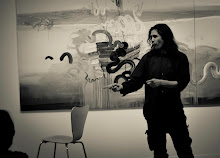One of the joys for me of reading and thinking philosophy is the sheer variety of different voices which it conjures up. Arguments resonate both between thinkers or schools of thought, but even more interestingly, within the same thinker. To Be a philosopher, and do it well, appears to me at least, about allowing many voices into one's head. The great philosophers are then directors as much as they are thinkers. The great works of philosophy, but even more the oeuvre of any one philosopher ought to be understood as much as a stage as it is a single corpus of thought... Upon this stage many thoughts happen, many openings are made, many arguments are aborted and yet left open and possible. A stage where much thought does happen, and yet so much more is also happening, or could happen or perhaps will at another time happen.
For me, of course this is why Stand Up Philosophy works - at its best it ought to liberate not just books from libraries, but also the many voices in the one thinker. This performance of the Four Minute Foucault is my first real attempt to make these voices palpable and relevant. I am of course choosing an easy first target to do this with. One of the glories of Foucault is that there are many voices deliberately within the same text. He rejoices in the diversity of his own thought, and functions as the director par excellence. I am therefore merely following, as it were, his own 'performance notes', while letting the actors speak for themselves.
The result I hope, is not then just that there are many voices in the one performance, but rather that there are many moods. The piece is at times funny, other times thoughtful, sometimes shocking, occasionally controversial, and once in a way Messianic, while being at other times overtly political, but also historical, and above all rigorously analytical, and strangely balanced and scrupulously fair. And yet running across these arguments, and so necessary for them to work together, there has to be a measured narrative thrust, which keeps the action moving, the arguments evolving, and the conversation going. The audience must therefore trust the performance, and think it's going somewhere, even if they do not know where that is, or even what will happen next...
All I can say is, that for this piece, and this audience, I think it worked, and worked well. The only question is, can I do it for a less generous thinker than Foucault - one that attempts to stifle his many voices and pretend that they are not there, and that the book is his and HIS alone? So watch this space - Heidegger here I come!


No comments:
Post a Comment